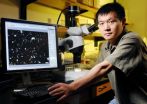(Press-News.org) What has made the Internet such a success could help change the way high-dollar and hazardous packages are tracked, according to Randy Walker of the Department of Energy's Oak Ridge National Laboratory.
Tracking 2.0, an ORNL system being developed by a team led by Walker, provides a clear start to finish view as an item moves to its destination, thereby eliminating the problem of proprietary and often incompatible databases used by various shippers. The system is the culmination of many years of research.
"Tracking 2.0 leverages eight years of ORNL research into supply chain infrastructure and test bed collaborations with state and local first responders, multi-modal freight service providers, private sector shippers and federal and international government partners," Walker said.
With Tracking 2.0, users will be able to share tracking data using existing tracking systems and leverage legacy and emerging technologies without having to retool the enterprise systems. In addition, users can deploy low-cost quick-to-market custom tools that combine proven security practices with emerging social computing technologies to network otherwise incompatible systems.
All codes translate to Uniform Resource Locators that point to tracking information. This address takes on the role of a permanent and unique "Virtual Resource Identifier," but does not require a priori agreement on a universal standard by all the stakeholders, which Walker described as "a difficult and open-ended process."
The system offers the ability to dynamically incorporate and associate searchable user-defined tags to the Virtual Resource Identifier. These tags are contributed incrementally by the various partners involved in the progress of the shipment, but they do not interfere with the seamless operation of the whole system.
Walker sees Tracking 2.0 as being a game changer that has been tested worldwide.
"The Internet with its seemingly endless stream of data has dramatically changed our ability to search and find information," Walker said. "We believe the same underlying social media and social networking methods that permit users to share photos and keep in touch with their friends and family can be repurposed to help supply chain stakeholders."
The system was developed in large part to help ensure the safe shipment of isotopes, which ORNL produces for industry, medicine and research. While the system has passed several tests, next up is a demonstration using a commercial isotope supply chain and next-generation sensor technologies, said Walker, a member of the Computational Sciences and Engineering Division.
###
Funding for this project has been provided by DOE's Office of Science and the Environmental Protection Agency.
UT-Battelle manages ORNL for DOE's Office of Science.
NOTE TO EDITORS: You may read other press releases from Oak Ridge National Laboratory or learn more about the lab at http://www.ornl.gov/news. Additional information about ORNL is available at the sites below:
Twitter - http://twitter.com/oakridgelabnews
RSS Feeds - http://www.ornl.gov/ornlhome/rss_feeds.shtml
Flickr - http://www.flickr.com/photos/oakridgelab
YouTube - http://www.youtube.com/user/OakRidgeNationalLab
LinkedIn - http://www.linkedin.com/companies/oak-ridge-national-laboratory
Facebook - http://www.facebook.com/Oak.Ridge.National.Laboratory
ORNL package tracking system takes social media to new heights
2011-06-14
ELSE PRESS RELEASES FROM THIS DATE:
Income disparity makes people unhappy
2011-06-14
Many economists and sociologists have warned of the social dangers of a wide gap between the richest and everyone else. Now, a new study, which will be published in an upcoming issue of Psychological Science, a journal of the Association for Psychological Science, adds a psychological reason to narrow the disparity – it makes people unhappy.
Over the last 40 years, "we've seen that people seem to be happier when there is more equality," says University of Virginia psychologist Shigehiro Oishi, who conducted the study with Virginia colleague Selin Kesebir and Ed Diener ...
Teacher unions that have lost collective bargaining will flex political muscle with money
2011-06-14
While several states have recently limited the ability for teacher unions to collectively bargain for their members, teachers will continue to flex their political muscle in a way scholars of policymaking have overlooked: through their pocketbooks, says a Baylor University political scientist.
Traditionally, the influence of teacher unions has been measured by the size of their membership or how active unions are in collective bargaining, said Patrick Flavin, Ph.D., assistant professor of political science at Baylor. But in a recent study, he found that teachers' unions ...
Brain state affects memory recall
2011-06-14
Lost your keys? Your brain might be in a better state to recall where you put them at some times than at others, according to new research from UC Davis. A paper describing the work is published June 13 in the journal Proceedings of the National Academy of Sciences.
"It's been assumed that the process of retrieving a memory is cued by an external stimulus," said Charan Ranganath, professor at the UC Davis Center for Neuroscience and Department of Psychology. "But we found that the levels of brain activity before items came up were correlated with memory."
Graduate students ...
Scripps Research team sheds new light on how blood clots form
2011-06-14
Scripps Research Institute scientists have discovered new elements of the blood clot-formation process. The findings could lead to better drugs for preventing heart attacks and other clot-related conditions.
The work, which was published by the Journal of Clinical Investigation in an advance, online edition June 13, 2011, helps to establish a new model of clot formation.
According to the old model, an injury to the wall of blood vessels causes smooth muscle cells to expose a clot-organizing protein called tissue factor. "In the emerging new model, tissue factor exists ...
Polyp miss rates high for colonoscopies done after poor bowel preparation
2011-06-14
OAK BROOK, Ill. – June 13, 2011 – A new study reports that colonoscopies done with suboptimal bowel preparation are associated with relatively high adenoma (precancerous polyp) miss rates, suggesting that suboptimal bowel preparation substantially decreases colonoscopy effectiveness and may mandate an early follow-up examination. In this study, in the context of suboptimal bowel preparation, of all adenomas identified, 42 percent were discovered only during a repeat colonoscopy, which was necessitated by an inadequate preparation during the first colonoscopy. The study ...
Genome offers clue to functions of destructive wheat fungus
2011-06-14
WEST LAFAYETTE, Ind. - One of the world's most destructive wheat pathogens is genetically built to evade detection before infecting its host, according to a study that mapped the genome of the fungus.
Stephen Goodwin, a Purdue and U.S. Department of Agriculture research plant pathologist, was the principal author on the effort to sequence the genome of the fungus Mycosphaerella graminicola, which causes septoria tritici blotch, a disease that greatly reduces yield and quality in wheat. Surprisingly, Goodwin said, the fungus had fewer genes related to production of enzymes ...
A scientific breakthrough at the IRCM could help understand certain cancers
2011-06-14
Montréal, June 13, 2011 – A scientific breakthrough by researchers at the Institut de recherches cliniques de Montréal (IRCM) will be published tomorrow in Developmental Cell, a scientific journal of the Cell Press group. Led by Dr. Frédéric Charron, the team of scientists discovered a new requirement for the proper functioning of the Sonic Hedgehog protein.
Sonic Hedgehog belongs to a family of proteins that gives cells the information needed for the embryo to develop properly. It plays a critical role in the development of many of the body's organs, such as the central ...
Under pressure, sodium, hydrogen could undergo a metamorphosis, emerging as superconductor
2011-06-14
BUFFALO, N.Y. -- In the search for superconductors, finding ways to compress hydrogen into a metal has been a point of focus ever since scientists predicted many years ago that electricity would flow, uninhibited, through such a material.
Liquid metallic hydrogen is thought to exist in the high-gravity interiors of Jupiter and Saturn. But so far, on Earth, researchers have been unable to use static compression techniques to squeeze hydrogen under high enough pressures to convert it into a metal. Shock-wave methods have been successful, but as experiments with diamond ...
Scientists find deadly amphibian disease in the last disease-free region of central America
2011-06-14
Smithsonian scientists have confirmed that chytridiomycosis, a rapidly spreading amphibian disease, has reached a site near Panama's Darien region. This was the last area in the entire mountainous neotropics to be free of the disease. This is troubling news for the Panama Amphibian Rescue and Conservation Project, a consortium of nine U.S. and Panamanian institutions that aims to rescue 20 species of frogs in imminent danger of extinction.
Chytridiomycosis has been linked to dramatic population declines or even extinctions of amphibian species worldwide. Within five ...
New study supports Darwin's hypothesis on competition between species
2011-06-14
A new study provides support for Darwin's hypothesis that the struggle for existence is stronger between more closely related species than those distantly related. While ecologists generally accept the premise, this new study contains the strongest direct experimental evidence yet to support its validity.
"We found that species extinction occurred more frequently and more rapidly between species of microorganisms that were more closely related, providing strong support for Darwin's theory, which we call the phylogenetic limiting similarity hypothesis," said Lin Jiang, ...

